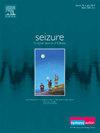Features of developmental coordination disorder and sleep difficulties in young adolescents with epilepsy: A case-controlled study
IF 2.7
3区 医学
Q2 CLINICAL NEUROLOGY
引用次数: 0
Abstract
Objective
The primary aim was to compare the prevalence of difficulties with motor coordination and sleep in young adolescents with epilepsy (11–16 years) (n = 60) and a healthy control group (n = 49). The secondary aim was to explore factors associated with sleep and motor coordination in the epilepsy group.
Methods
Children with ‘active’ epilepsy, controls, and caregivers completed a measure of sleep (Insomnia Severity Index and Child Sleep Habits Questionnaire respectively). Caregivers also completed a measure of child motor coordination – Developmental Coordination Disorder (DCD) - Questionnaire (DCD-Q). Comparisons between the epilepsy and control group were undertaken using chi-square analysis and independent t-tests. Factors associated with sleep and motor coordination in children with epilepsy were explored using linear regression analysis. Alpha level was p < 0.05 and effect sizes are reported using Cohen’s d.
Results
The epilepsy and control group were matched on age, gender, and socioeconomic status. Children with epilepsy were significantly more likely to be at-risk for DCD than controls (45 % vs 12 %; p < 0.001). Children with epilepsy had more sleep difficulties than controls on self (p = 0.003; d = 0.581) and caregiver reports (p < 0.001; d = 1.230). Linear regression showed that the factors associated with DCD-Q scores on multivariable analysis were: age of seizure onset (p < 0.001), child mental health (p = 0.013), child sleep problems (p = 0.034), and epilepsy medication (p = 0.030). Children with a younger age of epilepsy onset, with more self-reported mental health problems, on polypharmacy and experiencing more sleep problems had increased DCD-Q scores. Regarding child-reported sleep, children with more sleep difficulties had a significantly greater degree of reported DCD features (p < 0.001).
Significance
Young adolescents with epilepsy should be screened for sleep and motor coordination difficulties. Future research should focus on interventions to support children with epilepsy to reduce the impact of these difficulties on everyday functioning.
青少年癫痫患者发育协调障碍和睡眠困难的特点:一项病例对照研究
目的比较11-16岁青少年癫痫患者(n = 60)和健康对照组(n = 49)运动协调和睡眠困难的患病率。第二个目的是探索癫痫组睡眠和运动协调的相关因素。方法患有“活动性”癫痫的儿童、对照组和照顾者分别完成了一项睡眠测量(失眠严重程度指数和儿童睡眠习惯问卷)。照顾者还完成了儿童运动协调-发育协调障碍(DCD) -问卷调查(DCD- q)。癫痫组与对照组比较采用卡方分析和独立t检验。采用线性回归分析探讨癫痫患儿睡眠与运动协调的相关因素。α水平为p <;结果癫痫组和对照组在年龄、性别和社会经济地位上相匹配。癫痫患儿患DCD的风险明显高于对照组(45% vs 12%;p & lt;0.001)。癫痫患儿睡眠困难发生率高于对照组(p = 0.003;D = 0.581)和护理人员报告(p <;0.001;D = 1.230)。线性回归显示,多变量分析中与DCD-Q评分相关的因素有:癫痫发作年龄(p <;0.001)、儿童心理健康(p = 0.013)、儿童睡眠问题(p = 0.034)和癫痫药物(p = 0.030)。癫痫发作年龄较小、自我报告有更多心理健康问题、服用多种药物和经历更多睡眠问题的儿童的DCD-Q评分较高。关于儿童报告的睡眠,睡眠困难较多的儿童报告的DCD特征的程度明显更大(p <;0.001)。意义:青少年癫痫患者应筛查睡眠和运动协调困难。未来的研究应侧重于支持癫痫儿童的干预措施,以减少这些困难对日常功能的影响。
本文章由计算机程序翻译,如有差异,请以英文原文为准。
求助全文
约1分钟内获得全文
求助全文
来源期刊

Seizure-European Journal of Epilepsy
医学-临床神经学
CiteScore
5.60
自引率
6.70%
发文量
231
审稿时长
34 days
期刊介绍:
Seizure - European Journal of Epilepsy is an international journal owned by Epilepsy Action (the largest member led epilepsy organisation in the UK). It provides a forum for papers on all topics related to epilepsy and seizure disorders.
 求助内容:
求助内容: 应助结果提醒方式:
应助结果提醒方式:


